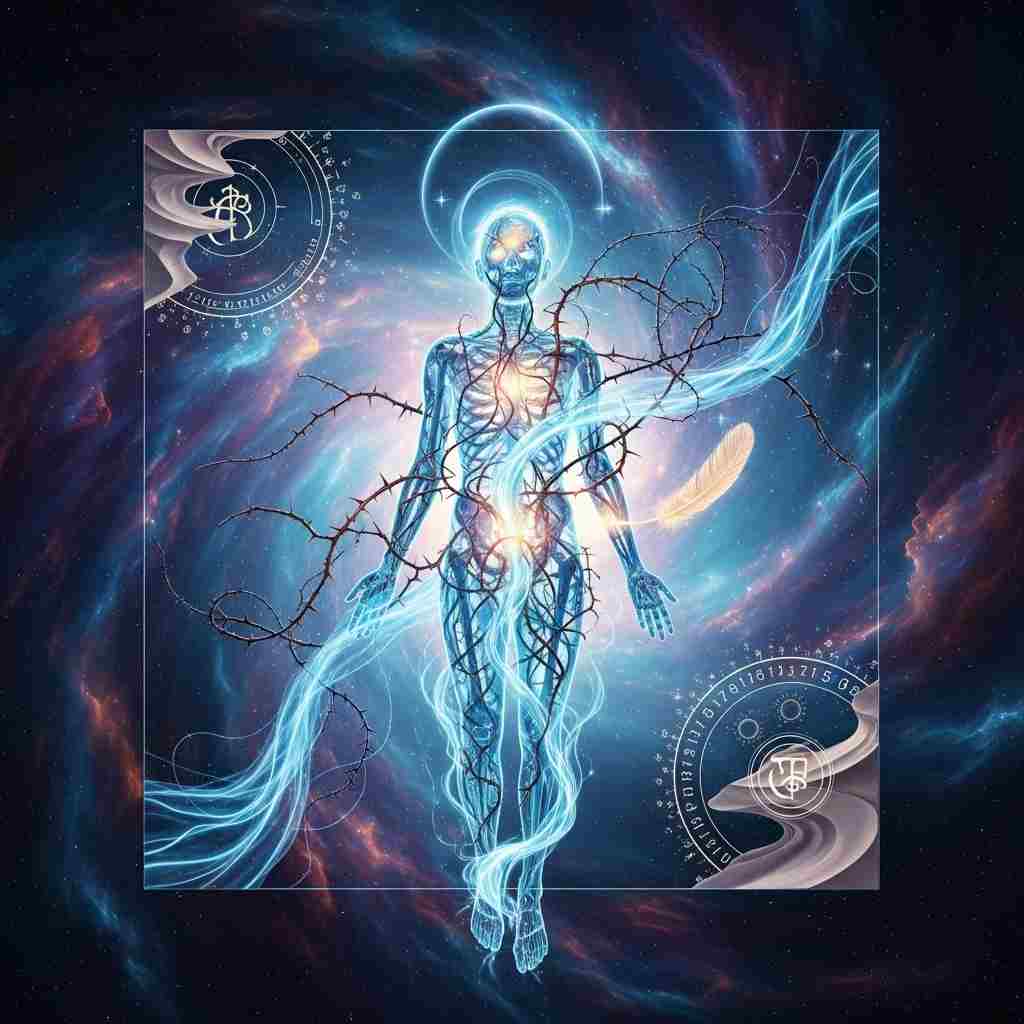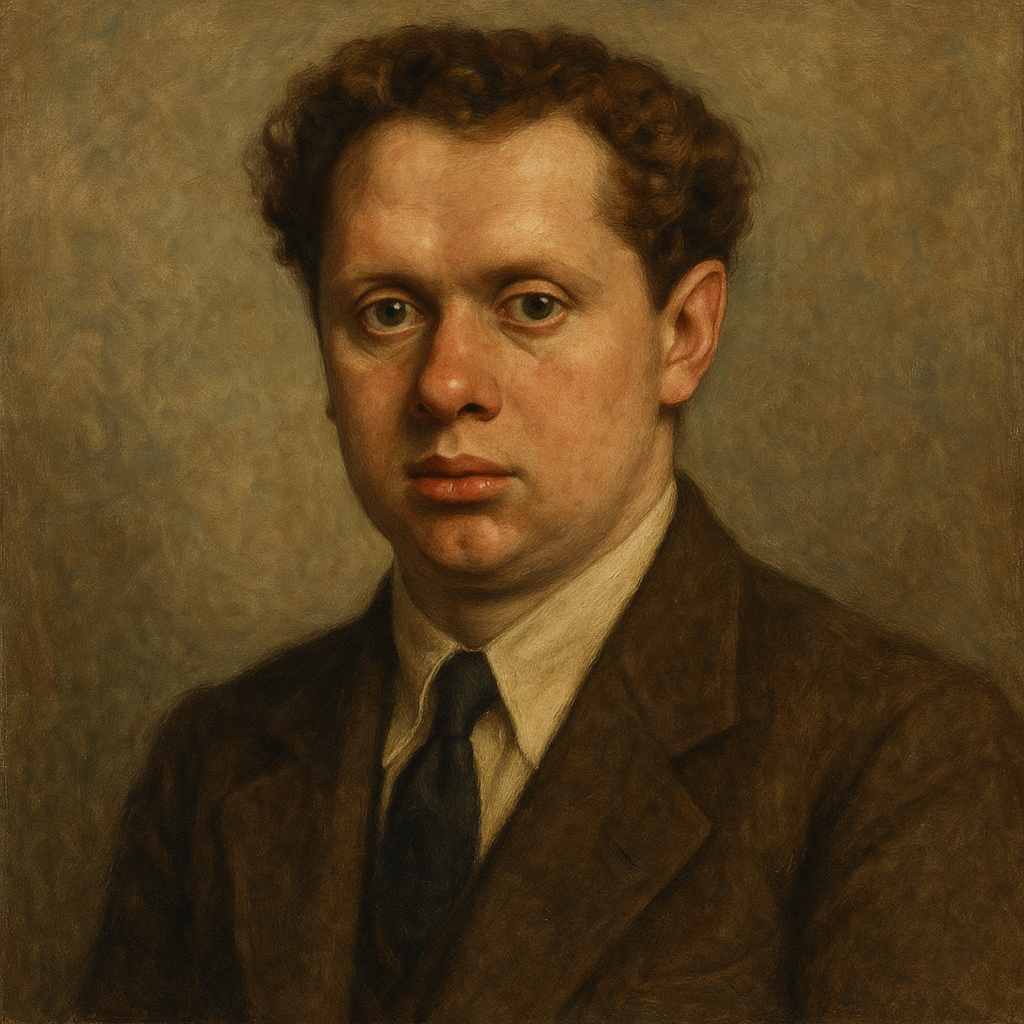Before I knocked
Dylan Thomas
1914 to 1953

Before I knocked and flesh let enter,
With liquid hands tapped on the womb,
I who was shapeless as the water
That shaped the Jordan near my home
Was brother to Mnetha’s daughter
And sister to the fathering worm.
I who was deaf to spring and summer,
Who knew not sun nor moon by name,
Felt thud beneath my flesh’s armour,
As yet was in a molten form,
The leaden stars, the rainy hammer
Swung by my father from his dome.
I knew the message of the winter,
The darted hail, the childish snow,
And the wind was my sister suitor;
Wind in me leaped, the hellborn dew;
My veins flowed with the Eastern weather;
Ungotten I knew night and day.
As yet ungotten, I did suffer;
The rack of dreams my lily bones
Did twist into a living cipher,
And flesh was snipped to cross the lines
Of gallow crosses on the liver
And brambles in the wringing brains.
My throat knew thirst before the structure
Of skin and vein around the well
Where words and water make a mixture
Unfailing till the blood runs foul;
My heart knew love, my belly hunger;
I smelt the maggot in my stool.
And time cast forth my mortal creature
To drift or drown upon the seas
Acquainted with the salt adventure
Of tides that never touch the shores.
I who was rich was made the richer
By sipping at the vine of days.
I, born of flesh and ghost, was neither
A ghost nor man, but mortal ghost.
And I was struck down by death’s feather.
I was a mortal to the last
Long breath that carried to my father
The message of his dying christ.
You who bow down at cross and altar,
Remember me and pity Him
Who took my flesh and bone for armour
And doublecrossed my mother’s womb.
Dylan Thomas's Before I knocked
Dylan Thomas’s Before I Knocked is a haunting meditation on pre-existence, embodiment, and the paradoxes of human mortality. Written in Thomas’s characteristically dense, lyrical style, the poem explores themes of origin, suffering, and the interplay between the spiritual and the corporeal. Through a series of vivid, often unsettling images, Thomas constructs a narrative that blurs the boundaries between life and death, divinity and humanity, creation and dissolution. This essay will examine the poem’s historical and cultural context, its rich literary devices, its central themes, and its profound emotional impact, while also considering philosophical and theological dimensions that deepen its resonance.
Historical and Cultural Context
Dylan Thomas (1914–1953) emerged as a major poetic voice in the mid-20th century, bridging modernist experimentation and a deeply personal, almost incantatory lyricism. His work is often associated with the New Romanticism movement, which rejected the intellectual austerity of high modernism in favor of emotional intensity and mythic grandeur. Before I Knocked reflects Thomas’s preoccupation with birth, death, and the cyclical nature of existence—themes that recur throughout his oeuvre, particularly in poems like And death shall have no dominion and The force that through the green fuse drives the flower.
The poem’s religious imagery—references to the Jordan River, Christ, and "gallow crosses"—situates it within a Christian framework, yet Thomas subverts traditional theology by presenting a speaker who exists before birth, suffering in a liminal state between spirit and flesh. This aligns with Thomas’s broader fascination with Welsh mythology, pagan symbolism, and the idea of an animistic universe where all life is interconnected. The reference to Mnetha’s daughter (an obscure figure possibly drawn from William Blake’s mythological system) further suggests an esoteric, syncretic vision of existence.
Written in the shadow of World War II, Before I Knocked may also be read as a response to the existential anxieties of the era. The poem’s preoccupation with suffering, mortality, and the fragility of the body resonates with the trauma of war, though Thomas’s concerns are ultimately metaphysical rather than explicitly political.
Literary Devices and Imagery
Thomas’s poetry is renowned for its lush, often paradoxical imagery, and Before I Knocked is no exception. The poem is saturated with visceral, sometimes grotesque metaphors that convey the speaker’s pre-birth consciousness.
1. Paradox and Oxymoron
The poem thrives on contradiction, beginning with the very premise of a speaker who exists before physical existence:
"Before I knocked and flesh let enter, / With liquid hands tapped on the womb"
The act of "knocking" implies agency before birth, while "liquid hands" suggests a formless, amniotic state. This paradox continues in lines like:
"I who was shapeless as the water / That shaped the Jordan near my home"
Here, the speaker is both formless and formative, evoking the biblical Jordan River (a symbol of baptism and rebirth) while remaining undefined. The oxymoron "mortal ghost" further destabilizes the boundaries between life and death, spirit and matter.
2. Mythic and Biblical Allusions
Thomas weaves together Christian and pagan imagery to create a mythic framework for the speaker’s pre-existence. The reference to Mnetha’s daughter (from Blake’s Tiriel) introduces an element of esoteric mythology, while the "fathering worm" suggests decay and cyclical regeneration, evoking both the biblical serpent and the inevitability of bodily decomposition.
The poem’s closing stanza invokes Christological suffering:
"Remember me and pity Him / Who took my flesh and bone for armour / And doublecrossed my mother’s womb."
Here, the speaker aligns himself with Christ, yet the phrase "doublecrossed my mother’s womb" introduces a note of betrayal, complicating the redemptive narrative.
3. Sensory and Corporeal Imagery
Thomas’s language is intensely physical, even when describing pre-birth consciousness:
"The leaden stars, the rainy hammer / Swung by my father from his dome."
The celestial is rendered in tangible, almost violent terms—stars are "leaden," rain is a "hammer," evoking both creation and punishment. Similarly, the lines:
"And flesh was snipped to cross the lines / Of gallow crosses on the liver"
merge biological and sacrificial imagery, suggesting that suffering is inscribed in the body before birth.
Themes
1. Pre-Existence and Suffering
The poem’s central conceit is that the speaker retains consciousness before embodiment, experiencing suffering and desire in a proto-human state. This challenges Christian notions of the soul’s innocence before birth, instead presenting existence itself as intrinsically bound to pain:
"As yet ungotten, I did suffer; / The rack of dreams my lily bones / Did twist into a living cipher."
The phrase "rack of dreams" evokes medieval torture devices, suggesting that even in pre-life, the speaker is tormented by the inevitability of embodiment.
2. The Duality of Flesh and Spirit
The speaker exists in a liminal space—neither fully spirit nor fully flesh:
"I, born of flesh and ghost, was neither / A ghost nor man, but mortal ghost."
This duality reflects Thomas’s broader fascination with the tension between bodily decay and spiritual endurance, a theme explored in And death shall have no dominion.
3. Time and Mortality
The poem’s closing lines introduce a tragic irony:
"I was a mortal to the last / Long breath that carried to my father / The message of his dying christ."
Here, the speaker’s mortality is framed as both inevitable and sacrificial, reinforcing the idea that human existence is a fleeting, yet meaningful, intersection of divine and earthly forces.
Comparative Analysis
Thomas’s poem invites comparison with other works that explore pre-existence and embodiment. William Blake’s The Book of Thel similarly depicts a pre-born spirit questioning the necessity of earthly suffering, while T.S. Eliot’s The Waste Land engages with fragmented, mythic consciousness. However, Thomas’s approach is more visceral than Eliot’s and more theologically ambiguous than Blake’s.
A closer parallel might be found in the poetry of Gerard Manley Hopkins, particularly The Wreck of the Deutschland, which merges violent imagery with spiritual yearning. Yet where Hopkins seeks divine order, Thomas embraces paradox and unresolved tension.
Philosophical and Theological Dimensions
The poem’s exploration of pre-existence echoes Platonic and Gnostic ideas, particularly the notion that the soul suffers through incarnation. However, Thomas resists any clear doctrinal alignment—his vision is more chaotic, more rooted in the body’s materiality.
The final stanza’s invocation of Christ—"pity Him / Who took my flesh and bone for armour"—suggests a kenotic (self-emptying) theology, where divinity enters suffering rather than transcending it. Yet the phrase "doublecrossed my mother’s womb" introduces a note of betrayal, complicating any straightforwardly redemptive reading.
Emotional Impact
The poem’s power lies in its unsettling beauty—its ability to evoke both awe and dread. The speaker’s voice is at once intimate and mythic, drawing the reader into a consciousness that is both alien and eerily familiar. The imagery of "the maggot in my stool" and "brambles in the wringing brains" forces a confrontation with the grotesque realities of embodiment, while the lyrical cadences lend the poem an incantatory, almost sacramental quality.
Conclusion
Before I Knocked is a masterpiece of paradoxical imagery, theological ambiguity, and emotional intensity. Through its dense, resonant language, Thomas constructs a vision of existence that is at once primordial and deeply human, suffused with suffering yet strangely exalted. The poem stands as a testament to Thomas’s unique ability to merge mythic grandeur with visceral immediacy, offering a meditation on life, death, and the liminal spaces in between that continues to haunt and inspire.
This text was generated by AI and is for reference only. Learn more
Want to join the discussion? Reopen or create a unique username to comment. No personal details required!



Comments
No comments yet. Be the first to comment!